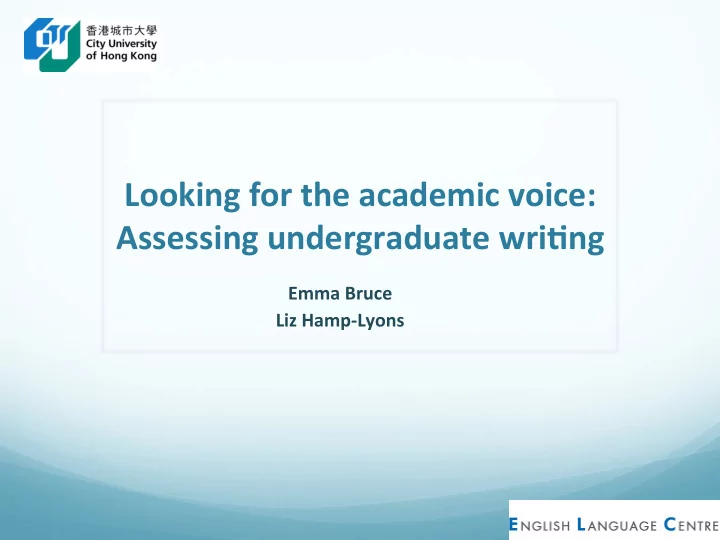

Looking ¡for ¡the ¡academic ¡voice: ¡ Assessing ¡undergraduate ¡wri7ng ¡ Emma ¡Bruce ¡ Liz ¡Hamp-‑Lyons ¡
¡ English ¡Level ¡of ¡CityU ¡Entrants ¡ ¡ Most ¡students ¡come ¡from ¡Chinese ¡medium ¡of ¡instruc1on ¡(CMI) ¡ schools ¡ à ¡low ¡levels ¡of ¡spoken ¡and ¡/or ¡wri<en ¡English ¡ ¡ Average ¡IELTS ¡score ¡of ¡new ¡undergraduates ¡is ¡a ¡li<le ¡below ¡6 ¡ ELC ¡offers ¡remedial ¡English ¡ à our ¡students ¡typically ¡score ¡3 ¡or ¡ below ¡in ¡HKDSE ¡/ ¡CEFR ¡A2-‑ ¡B1 ¡ Rough ¡Equivalent ¡ (pending ¡more ¡empirical ¡data ¡from ¡HKEAA) ¡ HKDSE ¡ IELTS ¡ CEFR ¡ 5*/5** ¡ 6.5 ¡ B2+ ¡ 4/5 ¡ 6 ¡ B2 ¡ 3 ¡ 5.5/below ¡ B1+/below ¡ 2
The ¡ELC ¡at ¡CityU ¡ Curriculum ¡renewal ¡focusing ¡on ¡developing ¡reading ¡and ¡ wri1ng ¡for ¡academic ¡study ¡ à ¡New ¡core ¡course: ¡144-‑ hour ¡general ¡EAP ¡course ¡ ¡ ¡ Text-‑based ¡curriculum ¡informed ¡by ¡genre ¡pedagogy ¡and ¡ SFL ¡ The ¡argumenta1ve ¡essay ¡is ¡the ¡main ¡wri1ng ¡genre ¡and ¡ assessed ¡task ¡ ¡ Assessment ¡development ¡ ßà ¡curriculum ¡development ¡ 3
Students’ Weaknesses in Writing More familiar with personal genres (narratives / recounts) & factual genres (procedures / reports) than analytic genres required at uni (persuasive / argumentative) (Martin, 1989; Schleppegrell, 2004 cited in Uccelli, Dobbs and Scott) Students not making their voice heard; for example they express opinions very mechanically, struggle to develop a position / stance and logically order propositions to support it Unfamiliar with intertextuality practices / writing multi-voiced texts: finding a " workable balance between self and source " (Groom 2000). “ [W]orking with source texts is one of the most challenging of all academic literacy activities for L2 writers" (Hirvela, 2013) Unfamiliar with academic register / nominalisation / information packing, lack of variety in sentence structure, poor lexical precision / diversity 4
Assessment ¡Design ¡Considera7ons ¡ Assessment ¡in ¡wri1ng ¡to ¡ “ reflect ¡not ¡only ¡the… ¡general ¡linguis1c ¡proficiency ¡of ¡the ¡ student, ¡but ¡also ¡their ¡ ability ¡to ¡use ¡the ¡forms ¡appropriately ¡within ¡the ¡social ¡and ¡ professional ¡conven1ons ¡of ¡wri1ng ¡in ¡the ¡target ¡language. “ Hamp-‑Lyons ¡& ¡Kroll ¡ (1997) ¡ “ Most ¡scales ¡of ¡language ¡proficiency ¡appear ¡in ¡fact ¡to ¡have ¡been ¡produced ¡ pragma1cally ¡by ¡appeals ¡to ¡intui1on, ¡the ¡local ¡pedagogic ¡culture ¡and ¡those ¡scales ¡to ¡ which ¡the ¡author ¡had ¡access. ” ¡North ¡and ¡Schneider ¡(1998) ¡ Ra1ng ¡scales ¡used ¡in ¡the ¡assessment ¡of ¡second-‑language ¡proficiency ¡oben ¡have ¡no ¡ basis ¡in ¡actual ¡performance. ¡Cumming, ¡Kantor, ¡& ¡Powers ¡(2001, ¡2002), ¡Fulcher ¡(1987) ¡ Descriptors ¡to ¡be ¡empirically ¡developed ¡/ ¡data-‑driven ¡from ¡student ¡samples ¡at ¡varying ¡ levels ¡of ¡proficiency ¡so ¡that ¡they ¡accurately ¡reflect ¡the ¡features ¡found ¡in ¡real ¡student ¡ wri1ng. ¡Hamp-‑Lyons ¡(1990), ¡Fulcher ¡(2003), ¡Leki, ¡Cumming, ¡& ¡Silva, ¡(2008), ¡North ¡ (2003) ¡ Involve ¡teachers ¡in ¡the ¡process ¡to ¡increase ¡validity ¡and ¡investment ¡by ¡those ¡using ¡the ¡ scale. ¡Plakans ¡(2013) ¡ 5
The Development of the 6x6 Rubric Assessment development Iterative process Constant collaboration CILOS + with curriculum developing team course content Refining Pilot rubric January 2010 à Present Course ¡Intended ¡Learning ¡Outcomes ¡(CILOS) ¡ 1 ¡ ¡ write coherent academic texts using lexico-grammatical choices appropriate to the task, benchmarked against international standards 2 ¡ accurately summarise in writing the ideas of others 3 ¡ ¡ demonstrate an appropriate reading ability, benchmarked against international standards, to comprehend, analyse, synthesise and evaluate authentic texts in academic settings 4 ¡ ¡ recognise and interpret the discourse patterns and lexico-grammatical choices in academic texts 6 5 ¡ ¡ select and appropriately integrate relevant information from other sources into written texts 6 ¡ discover the conventions of academic writing through self-directed and classroom
Recommend
More recommend